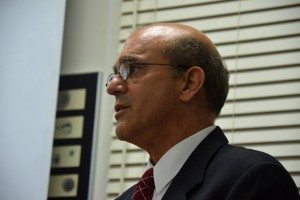
An administrative law judge in a series of five orders is recommending that former Flagler County Supervisor of Elections Kimberle Weeks and two acolytes who’d filed numerous frivolous formal complaints against county officials pay a combined $312,000 as the complaints were found to be malicious and groundless.
The orders are a remarkable victory for county government, and for Al Hadeed, the county attorney, in particular, who led the charge for reimbursements, or “recompense,” as the judge phrased it. It sends a strong signal from local government that while complaints about official conduct are part of doing business, frivolous, intentionally slanderous complaints intended exclusively to damage reputations and political prospects would not be absorbed without redress. While the county drew some criticism for carrying out what amounts to a retributive strategy, it could only do so while meeting an extremely high bar to prove that the complaints against officials had been recklessly false and intentionally slanderous.
The amount of money the judge is recommending be paid back reflects only a fraction of the legal fees that have accumulated since 2014, when members of the now-defunct Ronald Reagan Republican Assemblies, soon followed by Weeks herself when she was supervisor, started filing serial complaints in state venues–the Florida Ethics Commission, the Florida Elections Commission, the Florida Bar–against county commissioners, County Attorney Al Hadeed and County Administrator Craig Coffey. They filed 25 complaints in all, continuing to file them even as they were tossed out as frivolous, mutating them slightly into new but substantially similar versions as they refiled.
Flagler County sought payment for only seven of those cases, and a judge ruled in favor of the county on five of them, though it’ll be up to the Florida Ethics Commission on Oct. 20 and at its December meeting to decide whether to ratify the judge’s order, amend it or ignore it. The ethics commission usually follows administrative judges’ orders: it is the ethics commission that asks the Division of Administrative Hearings to assign a judge, conduct hearings and issue recommended orders in these instances. Susan Van Wyk, the administrative law judge, recommended the following:
- Weeks, who resigned from the supervisor’s office and was indicted on felony counts only peripherally related to matters raised in her allegations in the ethics case, filed a complaint against Hadeed through the ethics commission. A judge is recommending that she must pay $60,682. (See the judge’s order here.) Weeks’s felony case is a separate and continuing issue, with its next scheduled hearing before a judge in November.
- Weeks filed a complaint against Commissioner Charlie Ericksen. The judge is recommending repayment to Ericksen of $68,888 ($56,393 for costs incurred by Ericksen’s attorney, $12,949 for costs incurred by the county attorney’s office. See the judge’s order here.)
- Mark Richter Jr., the son of Mark Richter Sr., a 2014 candidate for the county commission, filed a complaint against Commissioner Nate McLaughlin. The judge is recommending repayment of $63,110 ($52,928 to McLaughlin’s attorney, $10,181 for costs incurred by the county attorney’s office. See the judge’s order here.)
- Mark Richter Jr. filed a complaint against the late Frank Meeker, the county commissioner who died in office last summer, of cancer. The judge is recommending repayment of $59,942 ($47,971 to Debra Meeker, the commissioner’s wife, and $11,971 for costs incurred by the county attorney’s office. See the judge’s order here.)
- Dennis McDonald, who’s run for the county commission, for Palm Coast mayor and for a local legislative seat–unsuccessfully all three times–and who’s married to School Board member Janet McDonald–filed a complaint against then-Commissioner George Hanns. The judge is recommending repayment of $59,042 ($48,500 to Hanns, and $10,541 for costs incurred by the county attorney’s office. See the judge’s order here.)
Should the ethics commission approve the repayment, Weeks, Richter and McDonald will have to pay the fees within 30 days or face civil action.

In an ironic reflection of the batch of complaints against county officials, each order follows largely the same template, with the signal difference that the orders are based on rigorous reasoning, evidence and law and written in coherent, logical English that flows from point to point to their conclusions, implicitly indicting complaints that lacked those very qualities, and explicitly condemning them for their nasty, brutish and transparent intent. As the judge wrote in Hadeed’s case: “The totality of these findings, including the number of complaints, the false complaints to The Florida Bar and the Elections Commission, the collaboration among the various complainants, and the inclusion of similarly false allegations in complaints filed by different complainants with different agencies, lead to no reasonable conclusion other than [Weeks’s ethics complaint] was filed with a ‘malicious intent’ to injure the reputation of Hadeed and create political gain for the Triple Rs and Weeks.” The judge added that the findings lead to “clear and convincing evidence that the true motivation behind the underlying complaint was the professional and political damage the complaint would cause Hadeed, with the corresponding benefit to the Triple Rs and Weeks, rather than any effort to expose any wrongdoing by Hadeed.”
Similar language is applied in the other orders.
The orders show that while McDonald alone participated in the discovery and hearing process, at least to some extent (and filed a motion to dismiss the counter-suit, which failed), Weeks and Richter did not. Richter’s father told officials who sought to contact his son in the matter that he did not know where he was or how to contact him, and hung up on the caller. Weeks largely evaded the process, at various points announcing that she would not be available for months on end, not answering her phone, and not responding to record requests. She had simultaneously claimed that she was immune from being sued because, she claimed, her own complaints had been filed as a representative of the Supervisor of Elections office, not as Kimberle Weeks individually, yet she refused to produce records in accordance with that claim. And Weeks, Richter and McDonald were all no-shows at the final hearing in the matter.
Though a state law allows a local government to recoup legal fees after defending against frivolous suits, it is an extremely high bar that requires proving that those filing actions against public officials are doing so maliciously and with reckless disregard for the truth. In other words, that they were doing so knowing that what they were filing was false, and was therefore knowingly slanderous and injurious to the subjects of the filings.
Hadeed and Mark Herron, his co-counsel through this process, made the argument that the repeated filings were exactly that: frivolous and intentionally injurious, and that they had cost taxpayers large sums to defend. In effect, they argued that the reason Weeks and others were filing those actions was not to reveal wrongdoing in public office, but to damage the reputation of office holders by abusing a system that allowed for accusations to be made and investigated publicly, a process that gives the appearance of wrongdoing even when investigations find the complaints to be worthless.

But after so many of these complaints had been dismissed, after they were filed in such a scattershot manner and found to be not only frivolous but injurious, and intentionally so, Hadeed and the County Commission agreed not to stop there but to counter-attack and seek compensation, both to refill the public coffer and to send a message: abusing a process must have its price, despite the difficulty of winning such cases. “It’s almost a New York Times v. Sullivan,” Hadeed said, citing the landmark 1964 Supreme Court case that established the standard that while public figures and public officials may claim to have been slandered, they have to show that the slander was carried out with actual malice and “reckless disregard for the truth.”
“That’s one of the standards we had to meet,” Hadeed said of the county’s counter-action against Weeks, McDonald and Richter, “that they did this maliciously and to use the process to injure the reputation of the office holders or the appointed and elected officials. It was a very high bar.” But the county’s argument cleared it.
Hadeed, who this summer was awarded a state ethics award, has long been Weeks’s whale to her Ahab, is not exactly celebrating.
“I don’t so much feel vindicated. I feel that the law was upheld,” he said in an interview today. “That’s sort of my mission in life, uphold the law, or do things that promote compliance to the law. And that’s no easy task because democracy is messy. Needs are urgent. People are emotional. It is better to try to fit activities into the rule of law, there are fairer outcomes in that environment. Now here, besides the rule of law, there was a fiscal accountability issue.” Taxpayers, he said, through no fault of their own, were subsidizing the legal defense of county officials, and would subsidize the increase in insurance premium costs to the county, which are driven by the number of claims filed against the county. Recouping that money became essential.
“So there was an accountability issue there that I thought was very important on behalf of taxpayers,” Hadeed said. “In that regard, to the extent we could, within the bounds of law, that interest was vindicated. Do I personally feel vindicated? That’s not the sense I have. It’s never been that kind of contest, because you cannot do a case, in my opinion, if that’s what you’re searching for, you’ll be a very poor advocate, you won’t understand the contexts. These contests aren’t a search for vindication as they are a search for the truth.”





























KMedley says
Karma!
Knightwatch says
Good! The local Ronald Reagan Republican Assembly plagued us for years. They disrupted, denigrated, fumed, fussed and harassed citizens and politicians alike, all because in their demented world no government is good government. They are gone now, but their anger and invective remain in people like Dennis McDonald. We have to scrape the last of them off of the bottom of our shoes.
Bill harvey says
All idiots that want to play games , now it’s time to pay ,small town politicians trying to act big time like they are in DC . I wouldn’t have them lead me out of a building building
joseph pulitzer says
Bravo Knightwatch!
Anonymous says
The ethics commission screens these complaints before they even take the time to investigate and rule on them. If they find merit the they move on with a pseudo trial where both sides present there facts in writing. To get to this point the commission has already determined the complaint is viable, not frivolous, or malicious. This whole thing smacks of slick lawyers trying to line their pockets at government expense.
Jim Neuenfeldt says
So out of curiosity, Has McDonald paid the original 15,000 judgement against him? What are the chances that these 3 pay even 1 cent to this win? I applaud the county attorney for standing up and doing what is right, but it is an expensive win!